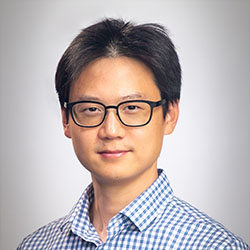Biography
Dr. Kim has received his B.S. degree (2002) with Biological Sciences major from Sungkyunkwan University and M.S. degree in Medicine (2005) from Seoul National University, South Korea. Then he moved to the United States to pursue his Ph.D. degree in Biomedical Sciences (2011) advised by Dr. Jonathan Horowitz at North Carolina State University, Raleigh, NC. Following postdoctoral trainings at the University of North Carolina at Chapel Hill (Mentor: Dr. Yanping Zhang, 2012-2014) and University of California at Los Angeles (Mentor: Drs. Amy Rowat and Erica Sloan, 2014-2020), he joined the Department of Pathology, School of Medicine at the University of New Mexico, Albuquerque, NM as an Assistant Professor on August 24, 2020.
Personal Statement
As a graduate student at North Carolina State University, I identified the transcription factor Sp2 as a novel oncogene by generating Sp2 overexpression transgenic mice. Realizing the importance of cancer cell metabolism in tumorigenesis, I pursued research as a postdoctoral researcher at the University of North Carolina at Chapel Hill. Here I investigated the role of p53 in metabolism using genetically modified mouse models. As a postdoctoral researcher at UCLA, I further expanded my research expertise into the field of cancer mechanobiology with the ultimate goal to develop an integrated understanding of regulatory role of cancer metabolism and mechanotype on cancer progression. By studying this emerging research area and applying my expertise obtained from previous trainings, I aim to better understand the cellular and physiological processes of how cancer cells respond to external soluble and mechanical cues for therapeutic benefits.
Complete list of my published work can be found at: https://www.ncbi.nlm.nih.gov/sites/myncbi/tae-hyung.kim.2/collections/61637063/public/
Areas of Specialty
Mechanobiology, Biochemistry, Cell and Molecular Biology, Breast Cancer Metastasis
Achievements & Awards
2025 Excellence in Research Awards – Junior Faculty, University of New Mexico Health Sciences Center
2023 Fellowship, Metastatic Breast Cancer Research Conference (MBCRC) Advocate Researcher Program (MARP) funded by The theresa’s research foundation
2023 Travel Award, Geographical Management of Cancer Health Disparities (GMaP) Region 3
2022 Fellowship, Transdisciplinary Research on Energetics and Cancer (TREC) Training Workshop
2020 Travel Award, The Biophysical Society Annual Meeting Scholarship
2018 Mogam Science Scholarship Foundation
2016 Travel Award, American Society for Cell Biology (ASCB) Annual Meeting
2009-10 Jimmy V-NC State University Cancer Therapeutics Training Program Scholarship
2009 Korea US Science Cooperation Center (KUSCO) and Korean-American Scientists and Engineers Association (KSEA)
Gender
Male
Languages
- Korean
- English
Courses Taught
BIOM 515 Cancer Biology (Director)
BIOM 508 Advanced Cell Biology (Block lecture)
BIOM 522 Methods in Cellular Biology (Block lecture)
BIOM 514 Immunobiology (Block lecture)
Research and Scholarship
We are interested in understanding the molecular links between metastatic breast cancer and hyperglycemic diseases such as obesity and diabetes.
Triple-negative breast cancer (TNBC), which is characterized by a lack of estrogen receptor (ER) and progesterone receptor (PR), and does not overexpress the human epidermal growth factor 2 receptor (HER2), is the most aggressive type of breast cancer. Approximately 10 – 20% of over 260,000 breast cancer patients are diagnosed with TNBC annually in the US and most have poor survival. However, TNBC does not yet have effective targeted therapy. Uncovering the mechanisms of TNBC metastasis and targeting these vulnerabilities could yield a substantial therapeutic impact.
Metastasis is a multistep process by which cancer cells disseminate from the primary tumor, migrate into circulation, and establish secondary tumors in other tissues. During this process, cellular mechanotypes play an important role as metastatic cancer cells have to deform to invade through narrow gaps in the extracellular matrix (ECM) and survive while they are in circulation. Cancer cell invasion through ECM requires the deformation of whole cells and the generation of traction force by the actin cytoskeleton and non-muscle myosin filaments.
We are currently working on identifying the novel Achilles heels of TNBC during invasion focused on regulating its mechanical properties, ultimately blocking its metastasis.

